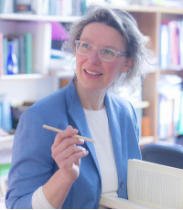£24m Investment into Adolescent Mental Health to Enable Young People to Flourish
UK Research and Innovation (UKRI) have announced a major £24 million investment into improving the mental health and wellbeing of adolescents in the UK. First Steps ED Trustee Dr Heike Bartel (University of Nottingham, Scholl of Modern Languages & Cultures) is Co-Investigator on one of the seven newly funded and highly ambitious projects that aim to generate a whole new understanding of the developing mind to enable young people to flourish.
From September 2021 until August 2025, Bartel will be working on the project ‘Eating Disorders: Delineating illness and recovery trajectories to inform personalised prevention and early intervention in young people (EDIFY)‘, led by Professor Ulrike Schmidt at Kings College London and Dr Helen Sharpe at the University of Edinburgh (£3.8m). Bartel will rely on her good partnership with the team here at First Steps ED and our innovative approach to supporting individuals with eating disorders.
Eating disorders are common, across the whole spectrum of society, with devastating impacts on young people’s lives, the research teams say. This project will see researchers work directly with young people with eating disorders to develop an interdisciplinary, evidence-based model of how these conditions develop and how young people recover. Bartel will co-lead the arts-humanities strand of this project researching how interdisciplinary narratives of illness and recovery and creative methods such as theatre, writing and comedy can be used to increase understanding amongst the public and professionals.
“Creative means like writing, comedy or theatre can be incredibly powerful and effective to amplify the voices of young people affected by eating disorders and to start much needed conversations. The strength of this project is its dedication to interdisciplinary work that brings science and arts & humanities together.”
Dr Heike Bartel, Department of Modern Languages and Cultures
Research co-leader Dr Helen Sharpe, of the University of Edinburgh’s School of Health in Social Science, says:
“Eating disorders are so often trivialised and misunderstood. This project provides an incredible opportunity to break down these stereotypes, and to build the foundations for treatments that are tailored to a young person’s unique circumstances.”
It is hoped this novel approach will transform the way eating disorders are understood and treated by challenging stereotypes and providing a ‘map’ for clinicians to tailor treatments to a young person’s individual circumstances.
To read more about any of the seven newly funded and highly ambitious projects, please visit the UK Research and Innovation (UKRI) website.




